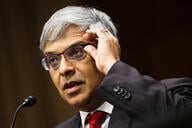You have /5 articles left.
Sign up for a free account or log in.
The Middle East Studies Association’s Committee on Academic Freedom has weighed in on the case of Emad Shahin, a prominent political scientist whose indictment on charges of espionage and subversion last month made international headlines. As The New York Times has reported, Shahin, who has taught at the American University of Cairo, Harvard University and the University of Notre Dame, was charged along with former President Mohamed Morsi and several other senior Muslim Brotherhood leaders with conspiring with foreign organizations to undermine Egypt’s national security. He was the second scholar to be targeted in what The Times described as a crackdown on critics of last summer’s military take-over.
Shahin, the editor of the Oxford Encyclopedia of Islam and Politics, called the charges “baseless,” politically motivated,” and “beyond preposterous” and said he had never been a member or supporter of the Muslim Brotherhood.
“Dr. Shahin is well known in both Egypt and the United States as a critic of the authoritarian policies and practices of the Egyptian state. He has been a consistent voice for democracy, pluralism and the rule of law throughout the political tumult in Egypt since January 2011,” the Committee on Academic Freedom wrote in a letter to Egypt's Minister of Justice. “We agree, therefore, with Dr. Shahin when he surmises that his 'true offense' is that he has been vocal in his criticism of 'the course of political events in Egypt since last summer.' We are deeply concerned that his indictment signals a decision on the part of the Egyptian state to hound all of its political opponents—regardless of partisan or ideological affiliation — and thereby suppress political dissent.”




